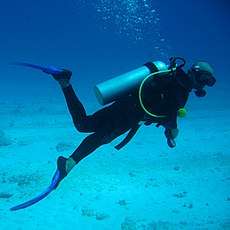List of legislation regulating underwater diving
This list identifies the legislation governing underwater diving activities listed by region. Some legislation affects only professional diving, other may affect only recreational diving, or all diving activities. The list does not include legislation or standards relating to manufacture or testing of diving equipment.
Australia
Queensland
- Safety in Recreational Water Activities Act 2011 (the SRWA Act) and the Safety in Recreational Water Activities Regulation 2011 (the Regulation).[1]
Austria
- Verordrung 501: Druckluft- und Taucherarbeiten- Verordrung[2]
- Inshore diving
Canada
Quebec
- S-3.1 Act respecting safety in sports, Chapter V.2 Recreative underwater diving 1997, c. 37, s. 2.[3]
- It is not permitted to dive or train divers beyond the level indicated by the certificate of qualification or attestation of equivalency held by the diver or instructor.
Denmark and Greenland
- Consolidated decree on the entry into force for Greenland of the act on diving operations and diving equipment, etc.[4]
- Diving Act, Act No.307, dated 17 May 1995
- The act regulates underwater work requiring breathing apparatus which would normally be done for payment, including rescue operations, and specifically excludes tasks related to recreational diving.
Germany
Israel
- Recreational diving Act, 1979[5]
- Recreational diving. It is not permitted to dive beyond the level of certification held unless in training with an instructor, and the diver must have appropriate insurance covering diving accidents.
Maldives
- Maldives Recreational Diving Regulation, 2003[6]
Malta
- Recreational Diving Services Regulation, 2012[7]
The Netherlands
Norway
South Africa
- Diving Regulations, 2009[8]
- DR2009 regulates all commercial diving operations and training, including military and other professional diving, inshore, inland and offshore, but explicitly exclude recreational diver training and dive shop operations, which are generally covered by the Occupational Health and Safety Act 85 of 1993.
- Code of Practice for Inshore Diving[9]
- The Code of Practice for Inshore Diving provides guidance for accepted safe working practices using surface supplied diving equipment for commercial diving operations within the territorial waters of South Africa. It is incorporated into the Diving Regulations as of 2017
- Code of Practice for Scientific Diving[10]
- The Code of Practice for Inshore Diving provides guidance for accepted safe working practices using scuba or surface supplied diving equipment for scientific diving operations within the territorial waters of South Africa.
- Code of Practice for Commercial Diver Training[11]
- The Code of Practice for Commercial Diver Training provides guidance and required minimum standards for accepted safe training practices using scuba or surface supplied diving equipment for diving operations in which learner divers are involved within the territorial waters of South Africa.
Sweden
- Dykeriarbete (English: Diving Works)[2]
- Regulates inshore and inland diving, no offshore regulations
Switzerland
- Verordnung 20.Jan.1961,SUVA Form 1526.d Publikation-Arbeitsmedizin Nr.8, Nov.1985 (Under revision)[2]
- Regulates inshore/inland diving, no offshore regulations
UK
- Diving at Work Regulations 1997[12]
- The DAWRs regulate all aspects of professional diving (diving at work), including recreational diver instruction and divemasters.
- Marine and Coastal Access Act 2009
- The MCAA specifies when a licence is required for an activity that involve depositing or removing a substance or object in the UK Marine Area below the mean high water springs mark.[13]
USA
- Regulations (Standards - 29 CFR), Part Number: 1910, Occupational Safety and Health Standards, Subpart: T - Commercial Diving Operations. Standard Number: 1910.424 - SCUBA diving.[14]
Exemptions
- Scientific diving
- Search and Rescue (some states, only when there is a reasonable expectation of rescuing a survivor)
References
- ↑ Staff (2 December 2011). "Recreational Diving, Recreational Technical Diving and Snorkelling Code of Practice 2011" (PDF). Queensland Government Gazette. Brisbane, Queensland: Minister for Education and Industrial Relations. Retrieved 16 November 2016.
- 1 2 3 4 5 6 7 8 9 10 Staff. "European Diving Regulations". The European Diving Technology Committee. Retrieved 16 November 2016.
- ↑ "Chapter V.2 Recreative underwater diving". S-3.1 - Act respecting safety in sports. Quebec City: Gouvernement du Québec. Retrieved 16 November 2016.
- ↑ Staff (16 December 2015). "Consolidated decree on the entry into force for Greenland of the act on diving operations and diving equipment, etc" (PDF). Act on diving operations and diving equipment, etc. Copenhagen, Denmark: Danish Maritime Authority (Søfartsstyrelsen). Retrieved 16 November 2016.
- ↑ "Recreational diving Act, 1979" (in Hebrew). Knesset. 1979. Retrieved 16 November 2016 – via WikiSource.
- ↑ "Maldives Recreational Diving Regulation" (PDF). Ministry of Tourism, Republic of Maldives. 2003. Retrieved 16 November 2016.
- ↑ "Legal Notice 359 of 2012: Recreational Diving Services Regulations" (PDF). Malta Travel and Tourism Services Act: Subsidiary legislation 409.13. Malta. 19 October 2012. Retrieved 16 November 2016.
- ↑ "Diving Regulations 2009". Occupational Health and Safety Act 85 of 1993 – Regulations and Notices – Government Notice R41. Pretoria: Government Printer. Archived from the original on 4 November 2016. Retrieved 3 November 2016 – via Southern African Legal Information Institute.
- ↑ Diving Advisory Board. Code Of Practice Inshore Diving (PDF). Pretoria: The South African Department of Labour. Retrieved 16 September 2016.
- ↑ Diving Advisory Board. Code Of Practice for Scientific Diving (PDF). Pretoria: The South African Department of Labour. Retrieved 16 September 2016.
- ↑ Diving Advisory Board (2007). Code of Practice for Commercial Diver Training, Revision 3 (PDF). Pretoria: South African Department of Labour. Retrieved 6 November 2016.
- ↑ Staff (1977). "The Diving at Work Regulations 1997". Statutory Instruments 1997 No. 2776 Health and Safety. Kew, Richmond, Surrey: Her Majesty's Stationery Office (HMSO). Retrieved 6 November 2016.
- ↑ Staff. "Marine licensing – Guidance for recreational divers". British Sub-Aqua Club. Retrieved 16 November 2016.
- ↑ "Subpart: T - Commercial Diving Operations. Standard Number: 1910.424 - SCUBA diving". Regulations (Standards - 29 CFR), Part Number: 1910, Occupational Safety and Health Standards. Washington, DC: US Department of Labour, Occupational Safety and Health Administration. Retrieved 16 November 2016.
This article is issued from
Wikipedia.
The text is licensed under Creative Commons - Attribution - Sharealike.
Additional terms may apply for the media files.
